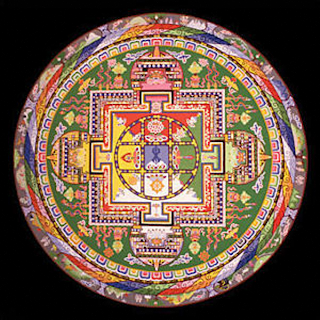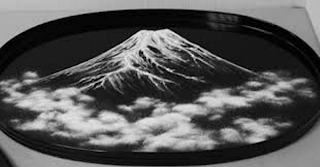According to the Wikipedia article Sandpainting is a time-honored art form, not always used just for purposes of display:
***
The Navaho people call sandpaintings "places where the gods come and go;" and the figures in their paintings "are symbolic representations of a story in Navajo mythology." In Tibet mandala sandpainting is a sacred art by the Tibetan Lamas of Drepung Loseling Monastery, used to heal the Earth.
***
***
There's also Japanese tray landscapes, called bonseki, with 3-dimensional elements, looking like miniature sculptures. A more permanent form is called bonga, meaning tray picture.
***
***
Present day sandpainting techniques use sand as the medium for an artwork. After the sand is placed, varnish is applied to fix it, making the work more permanent.
***
***
Another form of sandpainting includes elements of performance art. Below is work beautifully done by Ilana Yahav:
***
***
-- Marge
Unfixed sand paintings have a long established cultural history in numerous social groupings around the globe, and are often temporary, ritual paintings prepared for religious or healing ceremonies. It is also referred to as drypainting.***
 |
| Third Day Sandpainting, NavahoPeople.org |
The Navaho people call sandpaintings "places where the gods come and go;" and the figures in their paintings "are symbolic representations of a story in Navajo mythology." In Tibet mandala sandpainting is a sacred art by the Tibetan Lamas of Drepung Loseling Monastery, used to heal the Earth.
***
 |
| Yamantaka Mandala, theMysticalArtsofTibet.org |
There's also Japanese tray landscapes, called bonseki, with 3-dimensional elements, looking like miniature sculptures. A more permanent form is called bonga, meaning tray picture.
***
 |
| Mt. Fuji tray picture, Wikipedia |
Present day sandpainting techniques use sand as the medium for an artwork. After the sand is placed, varnish is applied to fix it, making the work more permanent.
***
 |
| The Sandpainter, "Winter Shadows," Wikipedia |
Another form of sandpainting includes elements of performance art. Below is work beautifully done by Ilana Yahav:
***
-- Marge

No comments:
Post a Comment